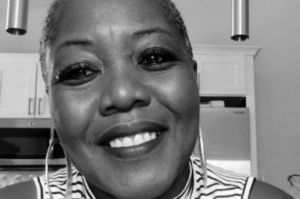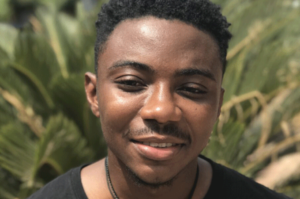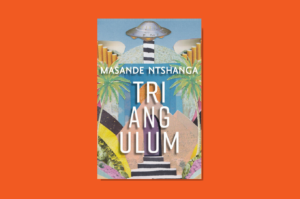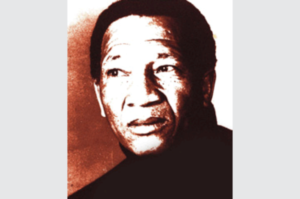
In 2004 I am six years old sitting in mama’s living room with eyes glued to the luminous TV screen in front of me. The electric fan swishes in circles overhead slicing the humid, summer atmosphere into cool pockets of air. I sit cross-legged on the blue carpet with a bowl of strawberry flavoured pops floating miserably in a pool of pink milk My spoon hangs limply in one hand. Big Bird, a yellow feathered creature with a comic looking beak spells out the word of the day on the street and the other cute caricatures and puppets join him filling the screen with their color and brightness. Elmo, my favourite red furry friend bursts into song and I bob my head along happily.
“And remember kids, breakfast is the most important meal of the day,” he admonishes as if looking directly at me and my unfinished cereal. I begin to shovel spoonfuls of milk and pops into my mouth and Mama laughs at me. “Maybe you shouldn’t watch TV when you’re eating.” Her tone is forgiving so I pay her no mind and forge ahead with my mission, all the while processing the new word I have learned for the day. Daddy comes into the lounge when I’m finished and switches the channel to something boring, news. I run off to brush my teeth and hum with a mouth full of toothpaste the theme song to Sesame Street.
Come and play
Everything’s A-OK
Friendly neighbors there
That’s where we meet
Can you tell me how to get
How to get to Sesame Street?
This is how my illicit love affair with words began, through a popular, children’s television program broadcasted from the west to the continent. I was intrigued by the cultural differences. The kids went to school in casual clothes. Their parents bought groceries in brown paper bags, unlike the see-through plastic bags Mama would get at the counter from an uninterested cashier whose eyebrows were slightly overdrawn, whenever we went to the supermarket. Peanut butter and Jelly sandwiches were another phenomenon I couldn’t quite wrap my head around. Why would anyone put a dessert on bread and then eat it? The realization only came to me much later in life, that jelly was jam over here. Perhaps I should write them a letter and let them know of the wonders of Sun Jam, I thought. I wanted to see people eating Sadza and highfiridzi like my family did most nights, instead, I saw American families at the dinner table eating meatloaf and cornbread. What was dinner anyway? The last meal of the day was called supper, everyone knew that.
One thing I saw on TV that we did have was pizza, and trips to Pizza Inn with my little sister in tow were the best. We would stare mesmerized through the protected glass as a man in uniform and chef’s hat tossed a wide, flat base of dough into the air with swift precision. It baffled our minds how the end result of all those air gymnastics would be a hot seasoned pizza bursting with meaty flavours. Life made sense back then or at least it made sense in the capacity I understood. I knew what an American dollar was but we had our own money which I thought was prettier. Now I can’t remember what it looked like.
2008 came and I was ten years old sneaking Nancy Drew novels under the covers at night with a dim flashlight to aluminate the words on the page. We had a frequent succession of power cuts and the shops were emptier. The shelves were bare and visits to the supermarket filled one with dread. Mama would cross the border between Zimbabwe and Botswana every month like most Zimbabweans to purchase groceries in Francistown. By then Dad had passed away and life looked a little different. We lived with Gogo and Sekuru, and mama was away more often. My grandmother would scoff at the boxes of cornflakes inside the Tshangani bags of food mama had procured. “On weekends you can eat this paper food, asi during the week idyai bota. It sits in the stomach longer.”
Now I woke up to watch cartoons with a bowl of steaming peanut butter porridge. It was delicious, warming the insides and leaving little beads of perspiration on the forehead from the effort of eating it so hot. News was depressing. Every evening we were splashed on the Headlines of BBC, CNN, and SABC. Zimbabwe was placed under Sanctions. The word sanctions fascinated me, it had so much power. One word was responsible for the empty shelves in the shop, for the fuel shortages, and the strange yellow mealie meal that was being distributed to civilians at food drives by NGOs. Poyoyo is what my older cousins called it.
“Why is it yellow?” I asked in consternation.
“It’s probably stuff they feed to their horses over there.” Gogo laughed heartily. “Beggars can’t be choosers, muzukuru.”
I fell deeper in love with words and books and stories. They provided a sweet escape from the mayhem that had ensued. On one occasion, mama’s frequent travels produced a new set of dolls and Bratz DVDs, but I was more enamored with the shiny new oxford mini dictionary and thesaurus amidst the new spoils. I pored over the index, inhaling the scent of new paper and knowledge. Words create worlds. Words destroy worlds too, and I’m stuck somewhere between the rubble of a burning building and a new, fragile thing that’s attempting to take flight on delicate wings.
At twenty-three I’m still looking for Sesame Street.
And Sesame Street is every foreign exploit, it’s the overseas universities young Zimbabweans flock to if privilege allows.
Sesame Street is the better house, the better car, the better job. It’s a collection of things material and immaterial. It’s the crossroads of a universal identity crisis, of the alluring pleasures of diaspora living juxtaposed against the erasure of self, of language, of heritage.
Photo by Godisable Jacob from Pexels










Victor October 04, 2021 19:12
Reading the last sentence and singing, asking if anybody can show me how to get to Sesame Street. This is how you know a beautiful piece. All the dots connect.